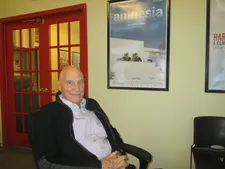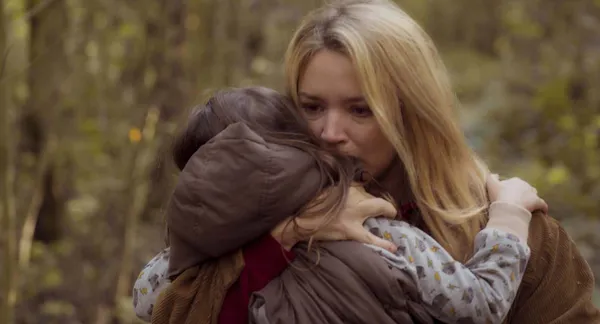 |
| Judith (Virginie Efira) with little Ninon (Loïse Benguerel) in Antoine Barraud’s mysterious Madeleine Collins |
Antoine Barraud’s Madeleine Collins, written in collaboration with Héléna Klotz, starring Virginie Efira, Quim Gutiérrez, Bruno Salomone with Jacqueline Bisset, François Rostain, Loïse Benguerel, Thomas Gioria, Théo Deroo, Nadav Lapid (director of Synonyms, Ahed's Knee), Nathalie Boutefeu, Mona Walravens, Frank Onana, and Valérie Donzelli is a highlight of Rendez-Vous with French Cinema and the Glasgow Film Festival.
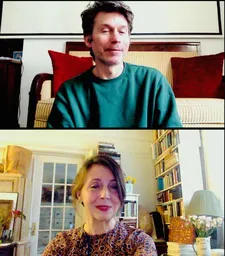 |
| Antoine Barraud with Anne-Katrin Titze on Maurice Pialat filming his son for Le garçu: “He said when you direct a child, it’s actually the child directing you.” |
Before Antoine arrived in New York, we discussed casting Bertrand Bonello and Barbet Schroeder, the long tradition of having women’s names as film titles (Mildred Pierce, Marjorie Morningstar, Annie Hall), novels and plays (Hedda Gabler, Effie Briest, Anna Karenina) to name just a few. In Antoine Barraud’s Portrait Of The Artist, Alfred Hitchcock’s Vertigo loomed large and we explore the unconscious mind of the Madeleine Collins filmmaker on the names he chose for his characters.
Judith (Virginie Efira) plays in a park with little 4-year-old Ninon (Loïse Benguerel). Ninon wears a tiara and has a foxtail attached to the back of her clothes. As many an upper-toddler, she combines the qualities of Beauty and the Beast. And she is not the only one, as we soon find out, who has two sides to her.
In Switzerland, Judith, who works as a translator, lives with Ninon and Ninon’s father Abdel (Quim Gutiérrez). She travels a lot, mostly to Paris by train, where she lives with her husband Melvil (Bruno Salomone), who is a famous conductor, and their two sons Joris (Thomas Gioria) and Victor (Théo Deroo).
Barraud also populates his story with several possibly foreboding figures on the sideline. There is Jacqueline Bisset as Judith’s mother Patty, whose comments on her daughter’s “bad taste in clothes” seem ludicrous and cruel. It is Bisset’s movie star authority that makes us think twice. Then there is Judith’s friend, the opera singer Madeleine Reynal (Valérie Donzelli), who works with Melvil and whose voice is enchanting audiences.
Running into people from your past in unexpected places can be dangerous for those leading a double life.
From Paris, Antoine Barraud joined me on Zoom for an in-depth conversation on Madeleine Collins.
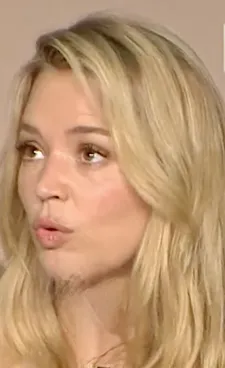 |
| Antoine Barraud on Judith’s (Virginie Efira) double life: “I thought this is really interesting because we have not seen that.” |
Anne-Katrin Titze: Hi!
Antoine Barraud: Bonjour!
AKT: Let’s start with the title of your film. There’s a long tradition of having women’s names as titles. I’m thinking Mildred Pierce and Marjorie Morningstar.
AB: Annie Hall!
AKT: Annie Hall! Or you can go to novels and plays - Hedda Gabler, Effie Briest, Anna Karenina. Madeleine Collins, after seeing the film has a slightly different meaning. Tell me about your choice of title!
AB: I think it’s exactly that. It’s because of that tradition or mythology of women characters that are so iconic. I didn’t scratch my head for days looking for a title. It just came up to me and there it was and I liked it. It sounds exactly as you say. To me it sounds like a novel from the 19th century and that’s exactly what I like about it.
To me, when you lie, if your life is a lie, as for my character, it’s like writing a novel. You have to be a generator of fiction all the time, and that’s very close to what I do as my job. I relate to that a lot. I like the proximity of lying and writing a novel.
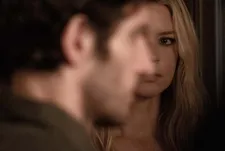 |
| Abdel (Quim Gutiérrez) with Judith (Virginie Efira) in Switzerland |
AKT: Then there are the specific names. Your main character is Judith and there is Madeleine. In your previous film Portrait of the Artist, Vertigo loomed large. So Judy to Madeleine is not a coincidence, is it?
AB: Well, I have to say it actually is. But I think my unconscious is very very active. It works full-time even when I’m sleeping. The character’s name was different until probably a month before the shooting and I changed it to Judith and I didn’t realize that I actually fell back on my feet in terms of Vertigo. It just never occurred to me that it was exactly that reference.
Also people come up to me about the blonde hair, I didn’t try to pay respect to any shot in Vertigo. Then again, Vertigo is one of the most beautiful films ever and I do love it more than anything and it was a reference in my previous film. I guess it’s still somewhere alive in me. It must be very alive in me because there you go.
AKT: I totally believe you that this is not a construction. These things happen unconsciously.
AB: Actually Hitchcock was not really on my mind when I started to work on this film. And when it was a little bit, Marnie was on my mind. Because Marnie is a thief, stealing and lying.
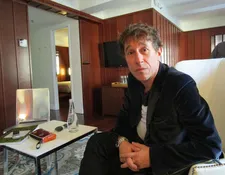 |
| Antoine Barraud: “There’s a sequence in Portrait Of The Artist where the young journalist asks Bertrand Bonello: ‘Do you want to be my friend?”” Photo: Anne-Katrin Titze |
AKT: And changing identity. Although it’s interesting that Judith never really changes her looks. In Marnie you have a change of hair color, here she can almost seamlessly move from one sphere to another without changing too much.
AB: Exactly. To me the difference to Vertigo is very much, as you say, the fact that she’s not changing. I’m not trying to make her look different in France or in Switzerland, blonde or brunette, or whatever, even though it’s a richer family in France. The biggest difference for me is that in Vertigo she’s a victim, when in my film I don’t think she is. It’s a bumpy road, some of t is painful, but she’s totally driving her own car when Kim Novak is not.
AKT: Judith is also being stopped for driving too fast!
AB: She is, but it’s not the end of the journey. She’s still going where she wants to go with a lot of bumps on the road.
AKT: The opening scenes are very beautiful and mysterious in that high-end department store. At first we might think it’s almost like Breakfast at Tiffany’s. It’s a safe place, there are people helping her - only later on audiences will come back to it in remembrance.
AB: In older drafts of the movie, the character you can see in the opening scene was actually in the story. Then I wrote it out of the movie and I came up with this opening scene. I thought it was interesting to have a very long master shot of this scene and character because it feels like a block of memory. The film you see after this sequence, there’s a lot of information, a lot of shots, a lot of editing.
This opening scene is the opposite of that. It’s one seven-minute master shot and you can feel every second, every step - it’s the actual duration of the action. It’s the only moment in the film that you get to meet this character and I really wanted it to be something that you can’t forget and also that you can’t doubt.
AKT: It’s very elegantly done, also how Jaqueline Bisset later on will trigger a memory. The first time we see Ninon [played by Loïse Benguerel], the little girl, is wonderful. She is wearing a tiara and a foxtail! She’s Beauty and the Beast, she’s La Belle et la Bête in one.
AB: Interesting! Thank you!
AKT: You’re welcome. In the little girl, there is already the kernel of a doubling. And she is great, just how you show her putting on her boots or playing with her toes in the stockings, she’s so completely unselfconscious.
AB: She was just wonderful to work with, even though at four years old there’s not much that you can control. I was lucky and happy that just days before the shooting I reread an interview of Maurice Pialat, talking about Le garçu, his last feature. He was filming his son in that last feature, who was five, I think, at the time. He said when you direct a child, it’s actually the child directing you. It was very freeing for me.
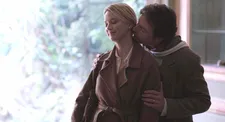 |
| Judith (Virginie Efira) with Melvil (Bruno Salomone) in Paris |
What I had to say to the crew was just to be in the mindset that it’s not us forcing the child to do anything. It’s just the child doing whatever she wants to do and us trying to grab some of that. It was very cute and very moving to just see her be herself. The coach would just tell her the lines and she would do that. It was very light, very playful. And of course Virginie Efira or Quim Gutiérrez playing with her in the shot were key elements of her being the character. They gave her a lot.
AKT: It elevates it, because it’s so natural. You like casting directors in your films. You had Bertrand Bonello and Barbet Schroeder previously. Here you cast Nadav Lapid. You like that?
AB: I do. I had no thoughts about it, it’s just something that I do. I think the fact that I did not go to film school - my school was just watching hundreds, thousands of films - made me not only the director that I am, but also makes me a person who likes to admire people. I do like to admire, I don’t feel diminished when I admire.
Also there’s a sequence in Portrait of the Artist where the young journalist asks Bertrand Bonello: “Do you want to be my friend?” It’s very pathetic and funny, but down the line, it’s pretty much what I mean when I cast them. I do like them and at the end of the day what I enjoy the most is not only their performance but to spend the day with them, because they’re great people.
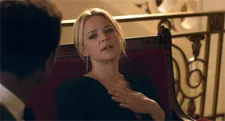 |
| Judith (Virginie Efira) reacts to hearing Madeleine Reynal’s (Valérie Donzelli) performance |
AKT: I do remember the scenes with the journalist very well, because asking questions is what I do too. I remember how very well-prepared he was and how he’s brutally pushed aside. These are great moments. The forger in Madeleine Collins has a very ominous line. He says to her “You’re an attractive woman who wears perfume, takes planes, goes to the theatre, and pretends not to be afraid. And when she’s afraid, it’s exciting.” It’s a terrifying moment! It’s like a stain where the film could turn much much darker.
AB: Yeah, different moments in the film are like that I think. They could really really derail. Like the forest at the end or this sequence. I liked this complexity. I wanted the thrill of not knowing where it’s going. Because now we know where it’s going most of the time.
Sometimes even just by watching the trailer of a movie you know where this is going. I’m not saying it can’t be fun; in genre movies you like the codes of vampire movies or in a remake, you like to see it coming. But it’s not the only thing. I remember the incredible thrill of thinking: where is this going? I want to be a part of the solution, the reflection and it’s so exciting when it’s like that.
AKT: We rarely see women in the situation of a double life. Several times throughout the film it becomes very clear how often we have seen the opposite. A child wanting daddy to be back and stay longer. We may think of Lindbergh and his double family; there are countless others. We rarely see that with women, one of the reasons obviously is childbirth.
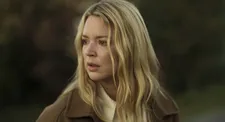 |
| Antoine Barraud: “When there’s something I can’t put into words, it probably isn’t words, it’s cinema.” |
AB: When there’s something I can’t put into words, it probably isn’t words, it’s cinema. That’s my first indicator that I might be on to something with this. I had no idea why this woman in the train - that was my first image in my mind - why this woman was going back and forth on a train, probably from one country to anther, one family to another. What was it that’s so intriguing? I couldn’t put my finger on it so I had to write the movie.
Then when I came up with what you said, the double life of a woman, I thought this is really interesting because we have not seen that. It’s like endless land there to be discovered. Like you said, especially the scene in the bedroom, directing it and watching it again in the editing room, I felt this is like a negative of a scene that we’ve seen so many times. In my film it’s Quim Gutiérrez saying to her “When you’re not here, I’m still a person!” I have needs, fears, I’m still someone. I’m just waiting for you to come back!
And she’s pretending to be this little birdie who doesn’t know what to say or to answer. But we’ve seen this scene so many times in life or in movies. But directing it was thrilling not only because she’s wonderful in it and he is wonderful in it, but it also felt strange that there is still so much to be done in terms of characters of women.
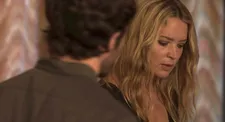 |
| Abdel (Quim Gutiérrez) to Judith (Virginie Efira): “When you’re not here, I’m still a person!” |
AKT: She is a translator by profession and in the train we overhear her say to someone on the phone “If I were is correct in English!” I want to talk about the two scenes taking place in the theater. His performance, conducting, and her panic attacks. The first time, the music and the singer’s voice [Madeleine Reynal played by Valérie Donzelli] are absolutely beautiful and I was wondering why she had to get up and out. Is this moment just too unbearably beautiful? Then it is doubled a second time as if whenever she is in his environment she cannot stand it.
AB: It’s funny when you write stuff. For you it’s just one thing and then you bring it out and people come with their own vision. It’s so great every time; I love it. To me it was very simple. It’s her almost directing herself as a director/actress into this same blood pressure thing. It’s her pretending to feel that blood pressure problem that she doesn’t have. That’s why the singer later asks her “What blood pressure problem? I’ve never heard about anything like that.”
So to me it’s just her pretending to be sick, to suffer from something. But I really like what you’re saying. I also like what you said earlier about the little girl and the foxtail and the tiara - I thought that’s really nice to have Beauty and the Beast in the same body. But I also like this. It’s too much beauty and it’s also unbearable to be in his presence.
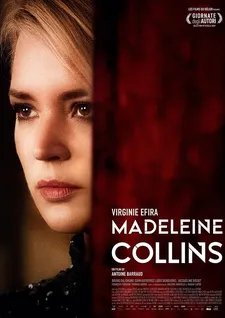 |
| Madeleine Collins poster |
Also I really wanted the husband to be likable even though he’s sort of egocentric and not very concerned by who she actually is. But he’s also really seductive, he’s fun, he’s making good money, he’s successful, he’s a loving, caring person. If he had been this toxic husband or even a non-lovable husband then the dilemma would be really weak.
AKT: Right. And then he is offering her the new house with the enchanted garden. The offer is all this beauty and what people think they should aspire to and all of this is what she rejects.
AB: Absolutely. It’s true. Not all of it is conscious. Like you said “If I were.” It is now conscious, but it wasn’t when I wrote it. It was conscious then I kept it. That’s the amazing thing about writing. I think you write with your hand a lot more than with your mind. And I like to write by hand and not with a computer for the first draft because I think it’s a physical profession, a physical action to write. A lot of it, not most of it, comes directly into the arm, the hand and into the pen.
And it does not go through my mind. My mind helps for the cleaning of it, the structuring of it. My work is actually to clean the tube so that the water can flow, so that nothing will obstruct this flow. It’s very humbling also, because it doesn’t come from me.
AKT: There is so much we don’t know. That’s why it’s lovely to talk to you. Are you still coming to New York?
AB: Yes, I’ll be there. Maybe I’ll see you around the festival!
AKT: Maybe see you there!
The remaining screening of Madeleine Collins in Rendez-Vous with French Cinema is on Saturday, March 12, 9:15pm (Q&A with Antoine Barraud)
The 27th edition of Rendez-Vous with French Cinema, organized by Film at Lincoln Center’s Florence Almozini and Madeline Whittle in collaboration with Unifrance runs through Sunday, March 13.
The Glasgow Film Festival runs through March 13.








